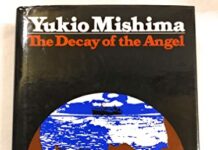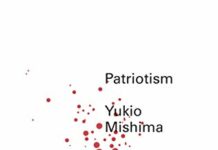
Ebook Info
- Published:
- Number of pages:
- Format: EPUB
- File Size: 0.44 MB
- Authors: Yukio Mishima
Description
A young man and his father find their views on patriotism conflict in Japan during the 1930’s
User’s Reviews
Reviews from Amazon users which were colected at the time this book was published on the website:
⭐The characters are all fascinating excepting the child fanatics. As the plot unfolds its a page turner. It has ups and downs but M’s downs get a ten from me. My regret is that I don’t know Japanese. I think all translations from Japanese are pedestrian. There must be a reason for the canned nature. I will never know it. I want to believe in Mishima.
⭐Beautiful narrative. Insightful demonstration of the traditional Japanese way of thinking. If you have ever been to Japan or are planning to go, read a Mishima Yukio book.
⭐I have just started reading Yukio Mishima’s books and find The Sea of Fertility beautifully written, fascinatingly descriptive of Japan and the era, plus an engaging saga. I couldn’t wait for the arrival of the second book in the series, Runaway Horses, and purchased the Kindle edition (starting it immediately)! I recommend this book (and author) to all readers and especially to those who want and expect more than just a momentary escape from tedium. Mishima delivers on all fronts and leaves the reader with intriguing thoughts and questions.
⭐As the title says, my fav! Ending is superb.The sea of Fertility is nothing short of a masterpiece. Mishima crucified himself in his work (SOF), and then did the same in real life.If you have not read Spring Snow yet, read that first before reading this book…If you have read Spring Snow, then why in the hell are you reading reviews of this book!? Get it, continue the journey!
⭐The four-part Sea of Fertility is one of the most ambitious literary projects ever undertaken. And it comes off. Runaway Horses is up there with Spring Snow as equal best of the four. It provides tremendous cultural and historical insights as well as wrestling with issues of motivation and purpose in Mishima’s crystalline prose. He thought he should have won the Nobel Prize. I do too.
⭐Tremendous insights into the Japanese mind set. Yukio Mishima was obsessed with Japanese honour and tradtions, but also obsessed with suicide
⭐This is the second book of Mishima’s tetralogy.
⭐This is obviously a much more politically charged work than Spring Snow, and it’s easy to read Isao, with his militant devotion and love of the most suicidal aspects of the Japanese Samurai tradition, as just a semi-autobiographical, younger version of Mishima. But this novel really functions as a searing portrait of the Japan of the 1930’s. Of a country trying to simultaneously modernize itself amidst famine, starvation, corrupt officials and an ever growing militarism while still clinging, with a fervor that can be hard to grasp, to the traditions of its imperial past.Runaway Horses is also just much more plot driven than Spring Snow, the previous book in the ‘sea of fertility’ series. The almost weepily beautiful descriptions in that book are somewhat curtailed here as Mishima dives into the world of political uprisings, Japanese court intrigue, legal procedure, etc. He has to do a lot of summarizing to really make it all fit together, which isn’t a bad thing, but I kind of wanted more endlessly beautiful images for my brain to dance around in. There are almost too many threads in this book to really unpack the implications of Isao’s real identity, especially in the book’s last quarter when it almost seems like watching a court room drama unfold before things suddenly shift gears and reach a climax that still feels smouldering even if it’s fairly predictable. No one but no one can end a novel the way Yukio Mishima can
⭐Beautifully written capturing a sense of time and place, characters vividly portrayed with depth and feeling. Themes of life, love, morality and mortality explored with skill and empathy.
⭐The Runaway Horses is even more ravishing than Spring Snow.Set 20 years after the tragic events ending the last novel, this volume opens gloomily with Honda as a judge. The story progresses through a series of occurrences that will leave Honda to doubt his initial composed, rational understanding of the world as he encounters young Isao Iinuma, none other than the sun of Kyioaki’s previous tutor, Iinuma.The story juxtaposes love and reason, passion and tranquility, as Honda learns to heed mysterious signs connecting Iinuma to the long-gone Kyioaki. In a struggle to redeem himself after feeling he had let down his friend two decades ago, Honda abandons his career as a judge to serve young Iinuma in a fight for freedom.Freedom from corruption, freedom from greed, from all worldly desires, are synonymous to complete loyalty to the Emperor in Iinuma’s heart.Isao’s speech during his hearing reverberates the pure spirit of Japan, led by an Emperor descendent from the Goddess of the Sun, to whom the people, his children, will forever pledge allegiance. In his monologue, Isao explains how we would like to tear down the clouds that harm the pure rays of sun emitted by His Majesty — in other words, he aims to destroy the corruption that eroded the purity of the Japanese spirit and that separated the Emperor from his disciples. Isao sees the rising zaibatsu, modern firms that in their restlessness for money impoverished Japan, as the source of all evil. They are to blame for having viciously corrupted the politicians who should have been the force behind the Imperial Will and acted as intermediaries between the Emperor and his children, the people of Japan.Striking these conglomerates, in Isao’s view, will restore Japan’s health and sanity. Following the path of the activist Wang Yang-ming, Isao believes that “To know and not to act is not to know.” This comes at a cost, despoiling the doers of their virtue, of their purity, like a luminous vase crumbling under countless cracks furrowed all over its surface. The price to pay is seppuku. Only then will the corrupt and those pure who soiled their hands with corrupt blood — an allegory explained by Isao to Prince Toin as a present of rice offered to the Emperor which, one way or the other, must lead to the death of the person who bestowed the gift — be purified and rise to heaven in full glory. Only then can the sun shine freely beyond the clouds and reach the destitute people of Japan, and embellish them with its pure rays of eternal light.
Keywords
Free Download Runaway Horses (Sea of Fertility) in EPUB format
Runaway Horses (Sea of Fertility) EPUB Free Download
Download Runaway Horses (Sea of Fertility) EPUB Free
Runaway Horses (Sea of Fertility) EPUB Free Download
Download Runaway Horses (Sea of Fertility) EPUB
Free Download Ebook Runaway Horses (Sea of Fertility)




